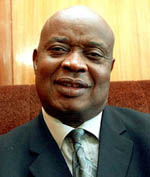MDC-T’s political agenda obscure

In a further contribution in last week’s issue of The Saturday Herald, Biti contends that Manheru evaded the fundamental issues that he raised in his previous contribution that:
l Nationalism has failed the post-colonial state because, by its very nature, it does not have the capacity to rule;
l Nationalism in the post-colonial state was obsessed with nothing, but the retention of political power and
l The Zimbabwe post-colonial state is brutally against the emergence of the black bourgeoisie.
While I cannot argue for Nathaniel Manheru, I continue to have serious reservations about how Biti defends and elaborates his points of view.
In fact, I disagree with most of the points that he raises to support his argument. Let me deal with his views point-by-point and show where and why I disagree with him.
As I said in my response to Biti in an earlier contribution, it is not true that our nationalists who had the capacity to dislodge Rhodesian settler colonialism could not have the capacity to rule.
In my opinion, the most important attribute to rule is a clear political agenda.
Leadership managerial skills and appropriate and adequate training are also important requirements, but the most critical thing is a clear political agenda.
What was the nationalists’ political agenda at Lancaster House? What sort of a state did they intend to establish?
The conference almost broke down over the issue of land until interested parties like Samora Machel, for instance, threatened the nationalists would wage their war from inside Rhodesia if they did not reach an agreement at the conference.
He was tired of the war. The nationalists wanted to unconditionally give land back to the people because it was why they had gone to war.
Biti is suddenly talking as if MDC now embraces that agenda. But judging by his party’s fixation with the Rhodesians, and indeed the flurry of movement that we saw the white former farmers do around the country and the utterances they are alleged to have gone around making before the 2008 elections, it is difficult to believe the MDC now embraces that agenda.
Instead, it is easier to believe that if they get into power, the MDC would attempt to reverse the land reform programme. But of course, they would never be able to do that. There would be another war. Perhaps that is why the party thinks it’s convenient to posture as nationalistic. They have no choice if they want to remain politically relevant.
The on-going constitution making process has become an MDC nightmare. For the first time, they are coming face to face with people who tell them what they want enshrined in the constitution.
They are being told people went to war to get their land back. For the first time, the MDC realises they never had an agenda all along to serve the interests of the people through economic empowerment except to turn the country and the people into a social welfare case. There are countries like that not far away. They cannot hide the shameful fact that they are pushing someone else’s agenda.
The compromise that was eventually struck at Lancaster House regarding the thorny issue of the land, that for the first 10 years, land would be taken from the whites on a willing seller willing buyer basis, was a risky gamble on the part of the British mediators.
Perhaps they figured within the 10 years, something similar to the MDC 20 years later, would emerge and abort the fulfilment of the liberation war agenda. It was a terrible political miscalculation! Nothing similar to MDC happened in the first 10 years!
Ian Smith called the entrenched clause on land outright betrayal. The nationalists fumed because the liberation war agenda had been delayed by another 10 years. Those people who go around saying the land issue was a ploy by Zanu-PF to remain in power because they could have taken it during the first years of independence are being dishonest.
The nationalists were merely abiding by the provisions of the Lancaster House constitution before they could change it. Once the 10 years elapsed, they changed the constitution to take the land compulsorily, to take it by decree.
It was not a question of obsession with power as some armchair revolutionaries would want us to believe: it was a question of fulfilment of the liberation war agenda that had been delayed by 10 years. Is Tendai Biti telling now us his party, if elected to power, would have fulfilled that agenda?
Let us for a moment ignore the fact that MDC was created by the whites.
Let us ignore the fact that over 90 percent of their funding comes from Western international capital. Let us ignore the fact that MDC played a pivotal role in calling for the imposition of sanctions that have crippled the country.
Let us ignore the fact that MDC wanted to sweep into power riding on the back of people’s anger because of the suffering caused primarily by those very sanctions they called for.
Let us ignore MDC’s fixation with a Rhodesian called Roy Bennett and their desire to make him a minister in the Ministry of Agriculture; putting a Rhodesian in charge of the fundamental agenda of the liberation war. There is no way the MDC can fulfil the agenda of the liberation war.
In his eloquent contribution to The Herald, Biti wants to sound nationalistic. Except he doesn’t want to define the sort of post-colonial state his party wants to establish. Is he speaking on behalf of the MDC that we know or an MDC that he intends to create?
There is no way that the MDC that we know can fulfill the agenda of the liberation struggle. But even the MDC that he intends to create, if that is his desire, will be problematic.
If the example that he gives of some post-colonial African states inheriting billions of dollars in forex reserves that were quickly whittled away by the nationalists is anything to go by, it is constructed on a dangerous premise.
The inclusive Government’s Minister of Finance is unconsciously giving us the colonial state as his model! In other words, Biti wants to perpetuate the colonial state model!
If that is the case, then our disagreement with him becomes ideological. We did not fight the war to perpetuate the colonial state. We fought the war to replace it with a state that serves the interests of the people. The colonial model could afford to build huge forex reserves because it served the interests of a tiny colonial elite and their metropolitan.
The forex reserves in post-colonial African states got whittled away because they were suddenly channelled towards uplifting the lives of the previously marginalised indigenous majority.
The secretary general of MDC-T should be the last person to talk about the alleged mediocrity of the Zanu-PF leadership. He doesn’t have to look far in his party, only two positions up the hierarchy above him, to see how horribly mediocre his party’s leadership is.
What would any reasonable person think of a leadership that says one thing today and the exact opposite the following day? Take the issue of the constitution.
MDC rejected Zanu-PF’s initial suggestion of using the Kariba Draft.
When the MDC realised they did not have a people- driven agenda to build into the constitution and were actually being shamed by the people during Copac outreach meetings, they turned around and said they now wanted to use the Kariba Draft. What a shame!
The serious mediocrity continued to reflect itself in some of the candidates they forwarded to the Public Service Commission for consideration to take up senior government posts. Some of the candidates did not even have O-Level! Can you believe that?
Biti’s contention that Zanu-PF is against the emergence of a black bourgeoisie is difficult to comprehend.
By the way, the Leninist National Democratic State model that he uses as his paradigm has got an extremely sceptical view of the bourgeoisie.
Evidence around us abounds to confirm the scepticism. They are the CEOs who are content with a car, a company house, holiday allowances, school fees for the kids while they act as custodians and gate-keepers for international capital.
They are the eagles that President Mugabe said even if they knew they could fly, will refuse to fly. We have many around, even on the farms. We have farm foremen and their assistants left behind by the white farmers.
They refused land because they still dream the bwana will return.
One would have thought the 51 percent indigenous shareholding equity that the Government seeks to give to the locals, is primarily intended to create an indigenous bourgeoisie. Isn’t that so Honourable Minister?
Ko zvino muri kurasika papi shefu? Ndizvo zvamuri kunyeperana nevarungu kuti vanhu havana basa nekucontrola destiny yavo?
It is possible Biti might not be fully conversant with the issues that he is talking about or he is deliberating lying to us? That is the danger when a person plays someone else’s drum.
One of the positive things to come out of the war was the political education that we taught each other in the camps that we subsequently passed on to the villagers at pungwes in the rural areas during the night.
The education enabled us to understand the fundamental issues. That is why 30 years after the war; the villagers in the rural areas know why we went to war. And if the on-going Copac outreach programme is anything to go by, those in the towns are catching up fast.
They want more than the 51 percent equity that the Government is calling for. It’s for posterity.
Please Honourable Minister Biti, can you, in your next contribution tell us what the MDC political agenda is? Please, I beg you, please.
[email protected]











Comments